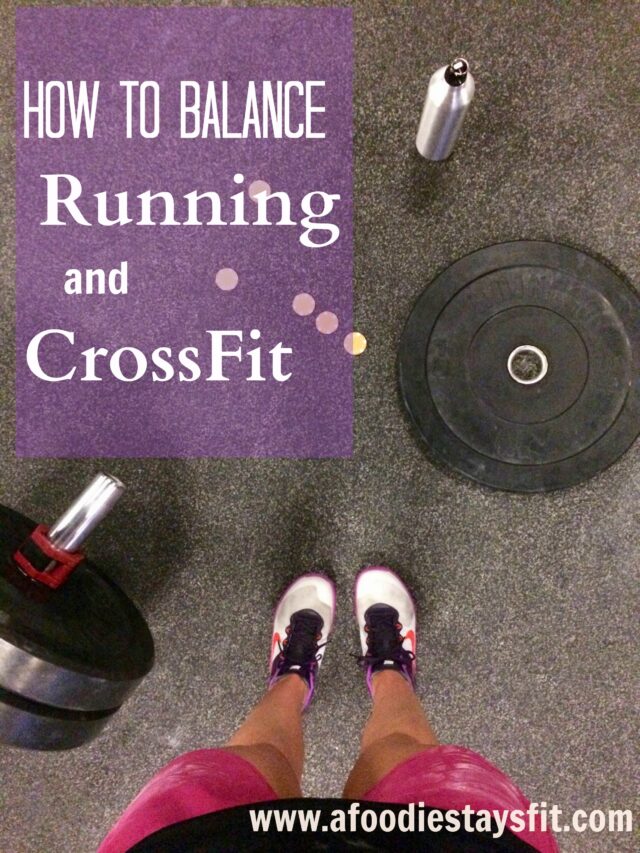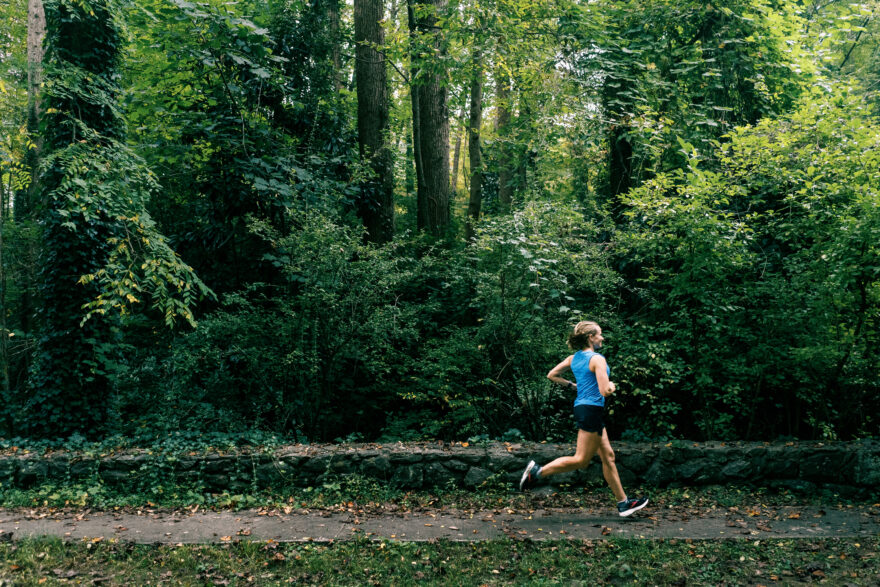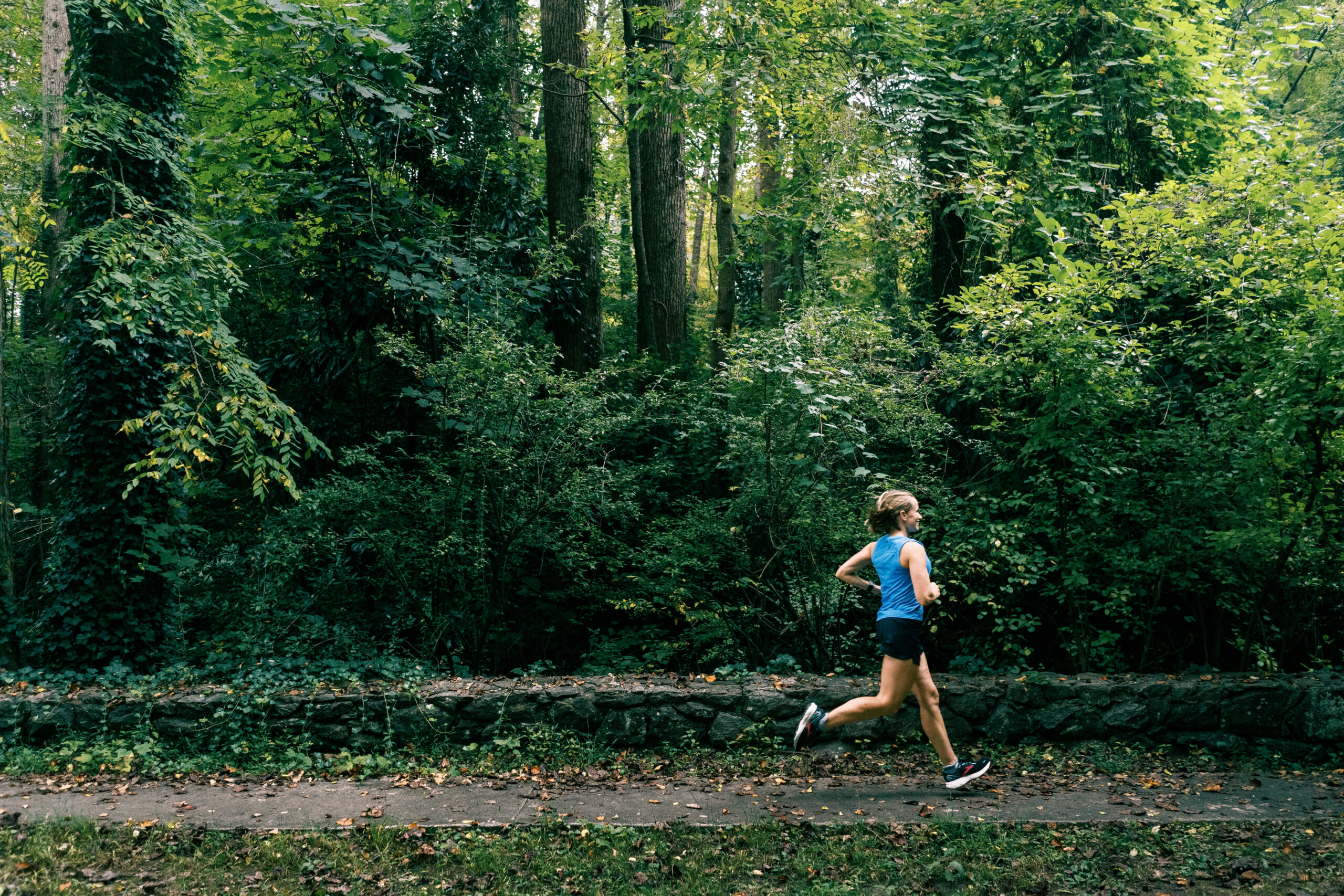


Learn why carbs are so important for runners and one of my all-time favorite carb sources that’s affordable and easy to find.
Carbohydrates are the body’s most efficient energy source for exercise. While there are so many different types of carbs and some are often labeled “good” and “bad”, in reality, when you’re a runner, all types of carbs have their role.
The main types of carbohydrates are simple carbs and complex carbs. So what’s the difference? You don’t need a degree in sports nutrition to understand the basics. Let’s break it down. Simple carbs digest more quickly and are higher on the glycemic index. Think things like chocolate milk, fruit, cookies, sports drinks, energy gels and GUs, white bread, white pasta, etc. You should consume simpler carbs the closer you are to running, since these turn to glucose (energy) more quickly in the bloodstream to provide energy for your run.
Complex carbohydrates are lower on the glycemic index, which means they don’t spike your blood sugar like simple carbs since they take longer for the body to breakdown. Rather, they provide longer, more stable energy. These are things like brown rice (a better alternative to white rice), oats, sweet potatoes, legumes, and whole grain bread. If your workout is 60 to 90 minutes away (or longer), complex carbs are more useful for a slower burning source of energy. And the majority of your carbs throughout the day should come from complex carbohydrates.

While I eat all of the items listed above (including white bread, white pasta and cookies!), when I’m deep in marathon training (and well, even when I’m not!), my favorite fuel source for carbs is sweet potatoes. Sweet potatoes rank up there as one of my all-time favorite foods (tied with toast!). I love their taste, versatility and affordability. Plus they’re easy to find at all grocery stores. And, fun fact, North Carolina actually produces most of the country’s sweet potatoes, which makes me proud. It drives me crazy when I go to local grocery stores and they have sweet potatoes that aren’t from NC!!! But, thankfully the farmer’s market always has NC grown ones and some of our grocery stores do too.
From a nutrition perspective, sweet potatoes have a good balance of carbs, fiber, protein and micronutrients to fuel runners. Sweet potatoes have even been labeled as the healthiest food by the Center for Science in the Public Interest. While sweet potatoes are a complex carb, they are typically much gentler on people’s guts pre-run than many other complex carbs. Even oatmeal can create gut issues for some runners. Sweet potatoes are often overlooked as fueling option for runners, but they’re an excellent source of carbohydrates. Let’s take a deeper look at their all-star nutrition status.
One regular sized sweet potato with skin provides about 100 calories and 25 grams of carbohydrates.
So how many carbs do you need before a run? Ideally between 40 – 60% of our overall energy in our diet should be coming from carbohydrates. Before an intense workout, that can be anywhere from 1-4 g/kg of body weight of carbohydrates. For example, a 150 lb person (68 kg) would need between 68 and 272 grams of carbohydrates before exercise. How much will depend on how long and/or intense your workout is. But even on the low end, that’s a LOT of carbs! If you top a sweet potato with a banana and a little honey, you’re getting closer to what your body needs.
During most endurance events (lasting up to 2.5 hours), the carbohydrate intake recommendation is 30-60 grams per hour. If you’re doing longer events, 2.5 hours+, you may need up to 90 grams per hour (source).
When we consume carbohydrates, like sweet potatoes, that energy can be used immediately for a workout or stored in the liver and muscles for future use. The stored energy is called glycogen and is depleted as you workout. For longer distance events (like the half marathon or full marathon), it’s super important to have enough energy stored to sustain you for a long time. Having adequate glycogen stores helps prevent the body from breaking down protein and muscle (yes, muscle!) to give you energy for high intensity workouts. If you have “hit the wall” in a race, that’s your body running out of fuel. That’s why carbohydrate intake before, during and after exercise is important for building, storing and replenishing glycogen.
One sweet potato contains 2 grams of protein and 4 grams of fiber. That helps balance the carbs to prevent a spike in blood sugar and help keep you full.
One medium sweet potato provides 120% of the daily recommended value of Vitamin A. Vitamin A plays a role in immunity, skin health and eye health (your body converts beta carotene from colorful veggies into Vitamin A) and Vitamin C is an antioxidant that helps slow and prevent cell damage that’s caused from oxidants or stressors in the environment. Vitamin C is also important for skin and joint health, your immune system and helps body absorb iron (and that’s especially important for female runners!). And you’ll get 30% of your daily needs from one sweet potato!
Pro tip from the NC SweetPotatoes Commission: For maximum absorption of vitamin A, be sure to pair your sweet potato with foods that contain some fat – such as a pat of butter or avocado.
Sweet potatoes are a good source of potassium, magnesium and manganese. These electrolytes are often lost through sweat and are important with muscle contraction, maintaining blood pressure, stabilizing blood sugar and regulating fluid balance.
I always scrub them to remove dirt and leave the skin on, which packs a nutritious punch!
I was OBSESSED with sweet potatoes when I was pregnant with Thomas, which is when the photo below is from.
Nutrition aside, here’s why else I love sweet potatoes to fuel my runs!
Many runners carb load the night before big races or workouts. But I actually try to carb load the entire week leading up to a race by eating the same way I always do. How does that work? By decreasing my training volume as part of my taper, my body is naturally storing away the extra glycogen that’s not being burned with as many miles. (Remember, glycogen is an energy source stored in your muscles that fuels your running and is replenished by carbs).
I always always always have sweet potatoes the night before a race. If I book an AirBnB, I cook them there, like I did before the Wrightsville Beach Marathon. If I have to dine out (like the last two years at Boston), I find a restaurant that has sweet potatoes on the menu. (For future reference, Dig in Boston has sweet potatoes!) I’ve even cooked sweet potatoes at home and packed them with me to a hotel. I feel that strongly about having a sweet potato the night before a race because it’s what I always eat before a long run!! (Don’t try anything new right before a race! That goes for gear and food!)
You can also eat sweet potatoes on race morning for sustained energy (as long as you’ve tested it in training, of course). In this post with pre-marathon breakfast tips, a registered dietitian shared one of her pre-marathon breakfast recipes and the star on the plate is a sweet potato! If you eat simple carbs on race morning, you’ll likely show up to the start line hungry. Eating a sweet potato will keep you full for the hour(s) that typically pass between the time you leave your hotel and get to the start line. Then, you can eat some simple carbs – like a banana or an energy gel – closer to the start time.
After almost all my long runs last year leading up to the Boston Marathon, I ate sweet potatoes post run. Most of us know the post-long-run gut woes a little too well and sweet potatoes never upset my stomach. They are a great side dish to eggs and the combination of carbohydrates that source of protein is what the body needs after a hard effort. And you can add sweet potatoes to a smoothie – here’s a recipe designed specifically for post-run needs! This is a great resource for even more recipes to incorporate sweet potatoes. You can even sort by pre run or post run.
Typically, you hear of runners eating pasta as their go-to carb. But pasta can spike your blood sugar and it’s often paired with something acidic (like tomatoes) or something heavy (like cheese), both of which can be disaster come race day.
And sweet potatoes actually have more energy-delivering complex carbohydrates than a cup of pasta. What about white potatoes? Russet potatoes are high on the glycemic index–even higher than pasta–which means their carbs get into the bloodstream fast. So keep that in mind and the timing of when you’d choose that over a sweet potato to fuel your workout.
I have sweet potatoes on hand at ALL times to serve a side dish with dinner, multiple times a week. I love them roasted whole, diced and roasted, cooked in an instant pot (here’s how to cook them in an instant pot) or baked into chips! Leftover sweet potatoes store beautifully in the fridge for 4-5 days so you can make a batch at the beginning of the week to fuel you all week. And that’s exactly what I do! (I have lived on sweet potatoes during my pregnancy so I go through a lot!)
Leftover roasted sweet potatoes can be reheated and served for breakfast with eggs or added to a salad. (Carbs make a salad taste better and help keep you full for longer!) They also make a great side dish with almost any dinner.
Obviously, sweet potatoes are sweet already (roasting brings out the sweetness even more). And if you add a little butter and cinnamon, you have a true treat. I also love sweet potatoes topped with almond butter and blueberries for breakfast. Or, just top them with butter and salt. Mexican night? Load them up with black beans, ground beef and salsa! They also take a veggie burger to a whole new level – try this black bean sweet potato burger recipe! I’ve even incorporated sweet potatoes into biscuits and waffles!
What are your go-to carb sources leading up to a race?
This post was originally sponsored by North Carolina SweetPotatoes Commission and I’ve since republished on my own because I truly love sweet potatoes THAT much!


Leave a Comment
One response to “The Best Source of Carbs for Runners”
I feel exactly the same about them! Also, thank you for extending even more knowledge to me. Cheers to sweet potatoes!?